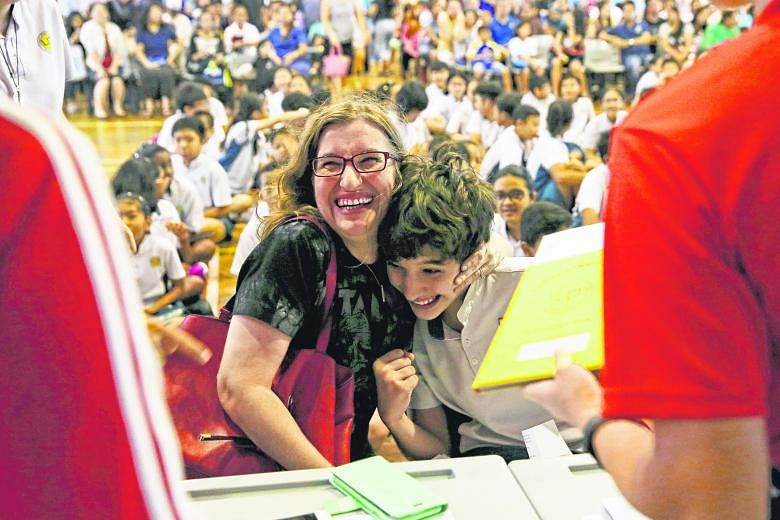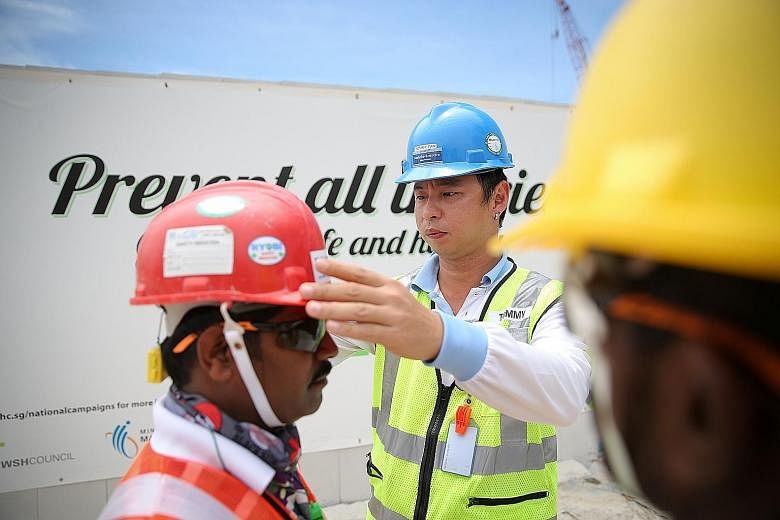A shift is sweeping through Singapore's education system, which is moving away from grades and book smarts.
The system is now embracing skills, interests and a sense of curiosity. Above all, it hopes to bring out a love for lifelong learning in Singaporeans, from pupils to workers with decades of experience.
To do so, the Ministry of Education (MOE) has rolled out policy changes at every stage, from primary to tertiary levels.
In a bid to reduce the emphasis on results, MOE announced a revamp of the Primary School Leaving Examination (PSLE) this year.
The PSLE will do away with the aggregate score, often criticised for causing excessive stress among pupils and parents. With the overhaul, pupils will no longer be graded relative to their peers from 2021.
Under the new scoring system, pupils' marks will be converted into grade bands 1 to 8, and their PSLE scores will be the sum of their grades in all the subjects, with 4 being the best score.
The move is aimed at encouraging pupils to focus on their own learning, instead of the competition. Pupils in Primary 1 this year will be the first batch subject to the revamped PSLE scoring and receive a new set of results in 2021.
The move is also meant to give pupils more space and time to pursue their interests.
Earlier this year, Education Minister (Schools) Ng Chee Meng said: "Let's help our children make good use of their time to branch out to explore other interests and passions and to pursue what they want to do in life.
"Let's help them make good choices about their educational and career pathways based on their aptitudes and aspirations. Let's help them be ready for the future."
MOE had moved to de-emphasise grades several years earlier, when it stopped highlighting top scorers when releasing results for national exams such as the PSLE and O levels.
While schools do recognise their best performers - as a group instead of individually - they also laud those who show improvement, overcome odds such as a disability or illness, or excel in areas such as the arts and sports.
In addition, secondary schools have been developing niche programmes so that pupils can choose options that match their interests when the PSLE scoring bands take effect.
More secondary school students will also be exposed to applied learning, which integrates learning with real-world situations.
This will also allow them to make better choices on courses to pursue when they move to the next rung.
Seven new subjects, ranging from robotics to sports science, are set to become part of the O- and N-level tracks, so students can opt for more hands-on learning.
These subjects, which will be rolled out over the next two years, will be available in more than 60 secondary schools.
O-level electronics and computing will be offered next year, along with three Normal (Technical) subjects - smart electrical technology, mobile robotics and retail operations. In 2018, drama, as well as exercise and sports science, will be added to the O-level curriculum.
The move away from grades is also taking place at centres of higher learning. Aptitude-based admission for five polytechnics and three of the local universities was expanded this year. The three universities are Nanyang Technological University, Singapore Management University and National University of Singapore.
This allows students to be assessed on a range of attributes and not just their academic scores. It also means more students can enter university based on other merits besides grades.
Singapore is also taking bold steps to make the transition between study and work seamless.
Apprenticeships, extended work stints and internships are in.
For example, the Earn and Learn scheme, a SkillsFuture initiative introduced in phases since last year, incentivises fresh polytechnic and ITE graduates to work and gain qualifications at the same time.
At the other end of the age spectrum, more workers are expected to head back to school.
As Education Minister (Higher Education and Skills) Ong Ye Kung said earlier this year, the lines between learning in school and training during employment will gradually be erased.
Already, institutions here are seeing their alumni returning as students once more.
The fast-evolving economy has prompted Singapore to make training and reskilling a priority, given that mid-career switches will become more common.
With the launch of the SkillsFuture drive about two years ago, the Government hopes more people will adopt learning as a lifestyle, even after the end of formal schooling. For instance, Singaporeans can sign up for courses on baking or developing mobile apps under the SkillsFuture Credit scheme.
In the first eight months of this year, more than 80,000 people signed up for the initiative, which gives Singaporeans aged 25 and older an initial $500 credit to pay for skills courses.
But the SkillsFuture Credit scheme is only one part of the Government's plan to get Singaporeans to think about lifelong learning.
There is a plethora of initiatives under the SkillsFuture umbrella.
However, putting programmes in place is the relatively easy part. The tough part is changing mindsets.
At The Straits Times Global Outlook Forum last year, Deputy Prime Minister Tharman Shanmugaratnam said that it is not a matter of government initiatives and training schemes, but a matter of culture - taking pride in mastery.
He added that Singapore needs to change its education culture - to move away from an obsession with children's grades and focus more on giving them diverse experiences.



